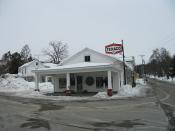John David Frodsham (1985) points out that to study George Orwell's 1984 is to note: "1984 will always remain as a menacing possibility" (p. 139). George Orwell, in his futuristic novel, 1984, incites the imagination of the reader to compare society today with that of the world in the novel. The totalitarian society depicted by Orwell did not achieve its power and authority only through violence, real or threatened, but through the isolation of every Oceania citizen and the incitation of propaganda. Such a division made meaningful discourse among them impossible and opened the door for the belief of propaganda because information came only from the Party. Although whitewashing world events, both past and present, to conform to the ideals of Ingsoc was important for maintaining the status quo, those acting on behalf of the state went even further in attempting to control the thoughts of the individual. In order to do this, they developed a language, Newspeak, that would restrict thought within clear and narrow paradigms.
That way, one could hardly dissent to anything since there would be no language to describe it.
As Orwell wrote in the Appendix, some "Newspeak words, of which oldthink was one, [were] not so much to express meanings as to destroy them (250-51) [original emphasis]." Consequently, those in charge took it upon themselves to redefine terms in order to conform to Party orthodoxy, often resulting in such oxymoronic minitruisms as "War is Peace," and "Freedom is Slavery." The Ministry of Truth is in charge of propaganda, for example, just as the Ministry of Love metes out brutal punishment. Since both 'truth' and 'love' retain their positive oldspeak connotations, both Party members and Proles accept and embrace the evils of Ingsoc as good, plusgood, or doubleplusgood, depending on their loyalty.
Orwell's notion...


